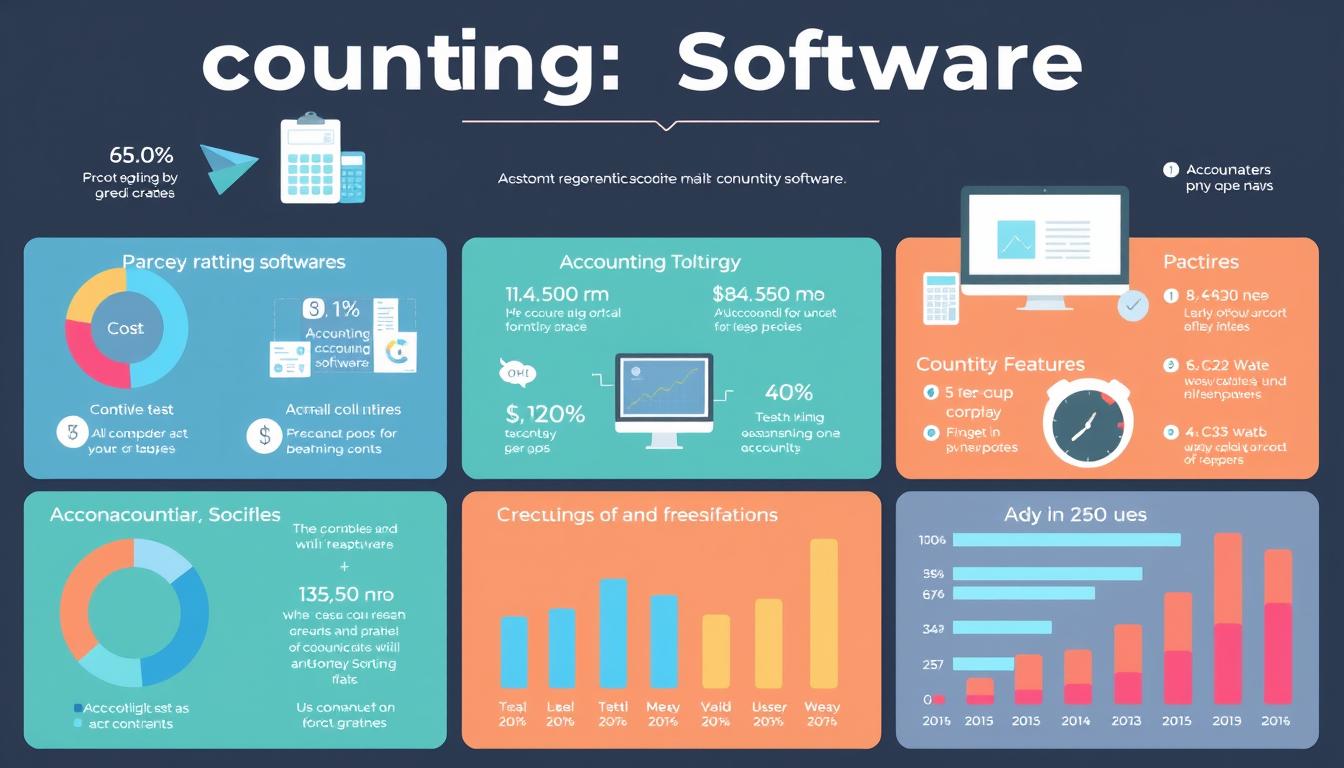Accountants
Accounting Software Compared
Envision commencing a Monday with aspirations of the week ahead, yet feeling daunted by the financial aspect of your venture. The intricacies of managing expenses, invoices, and payroll resemble a formidable peak, overshadowing the enthusiasm for growth and development. Into this complex scenario steps accounting software, a beacon of efficiency. By adopting adept accounting solutions, Australian businesses can optimise these facets, concentrating on expansion and success. This discourse will engage in a meticulous analysis of accounting software options available to Australian enterprises, examining their attributes, fiscal implications, and the overall satisfaction they deliver to users.
Key Takeaways
- Eight small business accounting applications stand out for their high ratings among users.
- Wave and TrulySmall Accounting are ideal for microbusinesses seeking simple solutions.
- Most applications offer free trials, allowing you to test before committing to subscription fees.
- Xero and Zoho Books provide advanced features that are beneficial for medium to large businesses.
- User reviews indicate Wave and FreshBooks as some of the easiest accounting software options available.
- Proper expense tracking can be managed seamlessly through various modern accounting tools.
- Canstar Blue’s satisfaction survey highlights a range of user experiences with different accounting brands.
Introduction to Accounting Software
In the current dynamic business milieu, grasping the fundamentals of introduction to accounting software emerges as indispensable for entrepreneurs. This technology stands as a cornerstone, facilitating the maintenance of precise and streamlined financial records. By automating diverse fiscal operations, it not only augments accuracy but also furnishes critical financial insights.
The spectrum of accounting tools for businesses spans widely, enabling entities of varying scales to optimize their accounting workflows. Irrespective of size, from nascent startups to seasoned conglomerates, adopting appropriate accounting software propels enhanced decision-making. This paves the way for a more calculated financial governance approach.
Key players in this domain include FreshBooks, Zoho Books, QuickBooks, and Wave, each proffering distinct features to cater to specific organizational requisites. Comprehending the advantages these tools offer proliferates operational efficiency and efficacy. Such tools mechanize tasks like invoicing, tracking payments, and generating reports, yielding significant time economy and cutting down on labour expenses.
The best accounting software comes replete with functionalities including revenue management, billing supervision, and asset monitoring. They not only accommodate immediate financial dealings but also evolve in tandem with your enterprise’s expansion. Centralizing financial data eradicates disjointed information repositories, enabling a unified, trustworthy data source. This, in turn, sharpens revenue forecasting and strategic competitiveness.
| Feature | Benefits |
|---|---|
| Automation | Simplifies routine tasks and reduces human error. |
| Business Insights | Provides real-time data and analytics for informed decision-making. |
| Scalability | Grows alongside your business needs and transaction volumes. |
| Centralization | Creates a single source of truth for financial data, enhancing reliability. |
Delving into the attributes and capabilities of diverse accounting software empowers the selection of an optimal solution tailored to your entrepreneurial ambitions.
Why Use Accounting Software for Your Business?
For small business owners, the adoption of accounting software brings manifold benefits. It streamlines intricate financial operations, empowering focus on expansion and strategic foresight. These platforms not only facilitate the seamless tracking of revenues and expenditures but also engender precise financial reportage. Such accuracy not only saves valuable time but also minimizes the likelihood of mistakes.
The consideration of accounting software for small entities is predicated on its capacity to furnish immediate financial insights. This attribute aids in making enlightened decisions, ensuring compliance, and promptly resolving any financial inquiries. The ascendance of cloud-based systems is attributed to their user-friendliness, remote access capabilities, and the ease of integration with various business tools.

- Task Management: Automates repetitive financial tasks, freeing your time for strategic initiatives.
- Banking Functionality: Integrates banking transactions for accurate reconciliations.
- Foreign Currency Support: Essential for businesses operating internationally.
- Financial Reporting: Generates comprehensive reports for better insights.
- Compliance Preparation: Ensures that your business adheres to regulations efficiently.
In the process of selecting accounting software, undertaking a cost-benefit analysis is paramount. This should encompass considerations such as training requisites, the provision of ongoing support, and the stability of the software provider. Engaging in consultations with seasoned accountants or counterparts in the industry can yield profound understandings. Furthermore, the practical testing of selected software using actual data is indispensable. It ascertains the software’s congruence with your business exigencies in terms of usability and functionality.
Accounting software significantly augments profitability via a spectrum of tools. Opting for an apt solution markedly enhances operational effectiveness. This allows for an undivided focus on primary business endeavours whilst managing financial affairs with commendable efficiency.
Top Features to Look for in Accounting Software
Identifying the correct accounting software necessitates a focus on specific features to boost your business operations. Primordial among these are ease of use and robust integration capabilities. These facets critically determine the effectiveness and productivity of managing your finances.
Ease of Use
The paramount feature of any accounting software is its ease of use in accounting. Ideally, it should possess an intuitive layout and simple navigation. This design enables users to effortlessly generate invoices, monitor expenses, and compile reports sans comprehensive training. Opting for software that offers straightforward directions and support amplifies productivity, particularly for individuals with limited finance know-how. It’s imperative for novices to select software that is not complicated, sidestepping potential productivity pitfalls.
Integration Capabilities
Accounting software integrations stand as another critical attribute. Ensuring your choice software can integrate flawlessly with other business tools, such as CRM platforms, payroll systems, and inventory management solutions, is vital. Such integrability elevates efficiency, diminishes data duplication, and promotes a unified operational flow. Additionally, it’s wise to contemplate software that meets the peculiar integrations your business might require.
| Feature | Importance | Benefit |
|---|---|---|
| Ease of Use | High | Facilitates quick financial task completion by individuals of all backgrounds |
| Integration Capabilities | Critical | Enhances workflow efficiency and saves time in data entry and management |
| Mobile Accessibility | Important | Allows for on-the-go access to financial data, vital for business owners |
| Comprehensive Reporting | Essential | Enables better financial oversight and informed decision-making |
| Customer Support | High | Ensures that you can receive assistance when needed, preventing downtime |
Popular Accounting Software Options in Australia
In the competitive arena of Australian accounting solutions, a variety of software caters to the demands of small to medium enterprises. Xero, MYOB, and QuickBooks offer distinct advantages tailored to your business needs. Selection between these options hinges on an in-depth understanding of their unique strengths.
Xero Overview
Xero’s distinction in the marketplace is attributable to a comprehensive feature set, curated for Australian business requisites. Its hallmark capabilities encompass automated bank reconciliation, sophisticated invoicing, and dynamic budgeting tools. Thanks to an intuitive interface, businesses gain immediate access to financial insights, facilitating informed strategic decisions. Furthermore, Xero’s strong integration with third-party applications augments accounting flexibility, ensuring uninterrupted operations across diverse platforms.
MYOB Overview
MYOB furnishes bespoke solutions that resonate with the unique demands of small to medium enterprises. Featuring offerings like MYOB Business Lite and AccountRight, it ensures pivotal functions such as payroll management, budgeting, and tax compliance are well catered for. This makes MYOB an ideal contender for businesses turning over up to $5 million annually. MYOB Business Pro, at $55 per month, presents an all-encompassing accounting package that judiciously balances cost against functionality.
QuickBooks Overview
QuickBooks stands as a versatile choice, servicing a spectrum of business models and needs effectively. It encompasses functionalities ranging from invoicing to cash flow management, streamlined to enhance your accounting operations. Known for its automated features, QuickBooks promotes efficiency within your business mechanisms. Its compatibility with EmploymentHero Payroll positions it as a formidable choice for entities demanding comprehensive accounting and payroll solutions within a unified framework.

Accounting Software Compared: User Satisfaction Ratings
User satisfaction ratings are pivotal in selecting optimal accounting software. Over 2,000 tools have been rigorously tested across varied finance and accounting scenarios. Such extensive evaluations, conducted by experienced CFOs, afford crucial insights into user experiences. They also elucidate the principal functionalities of these software platforms.
When determining superior user satisfaction accounting software, diverse criteria are employed. Core functionalities comprise 25% of this assessment, with another 25% attributed to standout features. Notably, customer ratings account for 10% of the selection process, underscoring the criticality of user experiences.
Below is a table showcasing leading accounting software choices, ascertained through user satisfaction ratings:
| Software | User Rating | Starting Price |
|---|---|---|
| Intuit QuickBooks | 4.4 | $17.50/month |
| Zoho Books | 4.4 | Free; $15/month |
| FreshBooks | 4.3 | $19/month |
| Xero | 4.2 | $15/month |
| AccountEdge | 3.9 | $20/month |
| NetSuite | 3.3 | Custom pricing |
| OneUp | 3.2 | $9/month |
| ZarMoney | 3.2 | $20/month |
| Neat | 3.1 | $200/year |
In the realm of financial management, an emphasis on AI-driven insights and automation is becoming increasingly apparent. There is a preference for cloud-based solutions, facilitating seamless collaboration irrespective of geographical constraints. Moreover, current trends in accounting software are integrating ESG reporting tools. This is in response to the growing imperative for sustainable financial practices. Such user-centric insights are invaluable, offering a transparent view of the software’s real-world efficacy and user satisfaction.
Cost Analysis of Accounting Software
The financial implications of adopting accounting software are pivotal in the decision-making trajectory. Such costs are greatly influenced by the software’s features and the unique requirements of your enterprise. You will come across a spectrum of pricing models, with monthly fees ranging from a modest $5 for basic versions to in excess of $100 for more inclusive packages. Undertaking a thorough cost-benefit analysis is crucial in navigating these options effectively.
Monthly Fees and Free Trials
Many providers of accounting software extend the provision of free trials. This strategic approach permits businesses to evaluate the software’s relevance and efficiency prior to making a monetary commitment. It’s a chance to delve into the software’s various capabilities and discern whether it resonates with the specific demands of your operations.
Value for Money Considerations
While quantifying the cost of accounting software, the notion of value for money must take precedence. Opting for the least expensive alternative does not guarantee optimality. The objective is to find software that not only economises time but also augments financial management. It is advisable to gauge the costs against the benefits provided, emphasizing the enhancement of productivity. A judicious investment in suitable accounting software could foster considerable savings over time, underscoring the importance of meticulous evaluation.

Accounting Software and Automation
Automation’s role in accounting software significantly elevates accounting efficacy. These tools slash the hours dedicated to manual data entry and iterative tasks, profoundly. By deploying automated financial operations, the fiscal team pivots from routine procedures to strategic endeavors propelling the business.
The integration of automation within accounting workflows offers manifold advantages. Research indicates that automation can reclaim up to 52 days annually for accountants by streamlining tasks such as tax processing and managing invoices. This liberates time, diminishes operational expenses, and mitigates the requirement for additional personnel during critical times like fiscal year-ends.
Contemplate the subsequent features to augment your accounting software:
- Automated data entry via OCR technology
- Immediate reporting for constant financial monitoring
- Bank reconciliation automation to smooth financial processes
- Effective cost management through expense supervision
- Staying compliant with tax regulations
- Workflow streamlining by integrating current instruments
Automation not only fortifies data consistency and precision across platforms but also facilitates the detection of anomalous patterns in fiscal records, crucial for deterrence of fraud. Enterprises adopting these features can uphold regulatory compliance while efficiently scaling their ventures to accommodate growing transactional volumes.
| Feature | Description | Benefits |
|---|---|---|
| Automated Data Entry | Utilises OCR technology to extract data from documents | Diminishes manual input mistakes and conserves time |
| Real-Time Reporting | Delivers immediate financial insights | Facilitates informed strategic decision-making |
| Bank Reconciliation Automation | Automatically matches transactions to bank statements | Eases the reconciliation operation |
| Expense Management | Automatically monitors expenditures | Assists in managing financial outflows |
| Tax Compliance Features | Ensures alignment with fiscal regulations | Lowers the risk of compliance violations |
Selecting the apt automation features in accounting software propels operational efficiency, fostering business growth and innovation.
Importance of Mobile Accessibility in Accounting Software
In the current dynamic business landscape, the imperative for mobile access within accounting applications is paramount. The ability to oversee financial matters irrespective of location proffers unmatched convenience, facilitating continuous monitoring of financial health. This capability bestows upon entrepreneurs the flexibility to execute essential financial operations beyond the confines of a conventional office environment, significantly boosting productivity.

Best Mobile Features
The pinnacle of mobile accounting functionalities greatly elevates the management of financial undertakings. Envisage the potentials:
- Mobile invoicing: Effortlessly generate and dispatch invoices from your mobile device, accelerating the receipt of payments.
- Expense tracking through camera uploads: Capture receipts with your camera for seamless integration into your financial records, optimizing expense tracking.
- Financial reports review: Engage with pivotal financial analyses on your mobile, enabling decisions anchored in current financial data.
Such features in mobile accounting software augment reactivity within daily tasks, keeping you adept and well-coordinated in finance management. The transition to accounting mobility is not just a convenience but a strategic advantage for entities aiming to outperform competitors. This shift towards flexibility and mobility is indispensable in mastering the intricacies associated with managing business finances.
Benefits of Integrating Payroll with Accounting Software
Integrating payroll with accounting software revolutionizes financial management within organizations. The fusion of these systems elevates efficiency and precision, offering profound benefits of payroll in accounting software.
Employing payroll management mechanisms within the accounting infrastructure eliminates redundant manual entry, minimizing human error risks. Such payroll accounting integration automates the synchronisation of employee details and wage distributions, ensuring precise financial records and adherence to Australian taxation stipulations.
The unified system’s real-time update capability allows for instant monitoring of payroll alterations and their direct financial statement effects. This automation ensures punctual payments and removes inaccuracies linked with manual handling. Thus, it liberates managers to concentrate on strategic organizational trajectories rather than administrative burdens.
Moreover, this integration grants employees direct access to their payment summaries and taxation documents via self-service portals. This level of transparency cultivates trust and autonomy among the workforce, enhancing overall job satisfaction.
Consider the following comparative insights:
| Feature | Traditional Payroll Processing | Integrated Payroll with Accounting Software |
|---|---|---|
| Time Efficiency | High manual effort, longer processing times | Automated processes save time and reduce staff workload |
| Error Rate | Higher likelihood of manual errors | Minimised errors through software automation |
| Employee Access | Limited information availability | Real-time access to pay information and documents |
| Cost Implications | Potential for penalties due to miscalculations | Reduced costs with streamlined processes and fewer errors |
Adopting integrated payroll and accounting solutions not only fortifies operational security but also provides a competitive edge in financial administration. Embracing benefits of payroll in accounting software equips enterprises for enduring expansion, guaranteeing regulatory compliance and elevating employee contentment.
How to Choose the Right Accounting Software for Your Business
Selecting the optimal accounting software is crucial for your entity’s monetary well-being. This process necessitates a comprehensive evaluation of your business’s specific needs. Discerning your organization’s precise requirements is the first step towards narrowing the array of options, thereby conserving time. Important considerations include the scale of your workforce, regulatory demands particular to your sector, and bespoke operational hurdles.
Assessing Your Business Needs
Initiate this endeavour by meticulously documenting your principal financial operations and pinpointing indispensable features. The array of criteria for choosing accounting software spans several dimensions.
- Budget: Establish your financial allocation for this purpose. Costs can fluctuate between $10 to $40 monthly, influenced by the requisite functionalities.
- Features: Essential functionalities commonly span invoicing, expenditure tracking, payroll services, and inventory oversight. Ascertain which among these are quintessential for your routine business procedures.
- Integration: Evaluate the degree of compatibility with existing digital tools and platforms in your operational ecosystem.
- Accessibility: Prioritize cloud-based solutions offering the flexibility of remote management, enabling financial oversight from diverse locations.
- User Support: Scrutinize the availability and quality of customer support, an indispensable resource in times of need.
Consultation with accounting experts or financial consultants can unveil bespoke software recommendations that harmonize with your operational frameworks. Through a meticulous appraisal of your business’s necessities and applying a discriminating criterion for selecting accounting software, the decision-making trajectory is not only streamlined but the efficacy of financial administration notably enhanced.
Accounting Software for Freelancers and Sole Traders
Freelancers and sole traders prioritize efficient financial management, deeming accounting software a crucial resource. Among various alternatives, QuickBooks Online and Xero significantly ease financial administration. This enables a sharper focus on principal business endeavors.
QuickBooks excels in automation functions, streamlining financial operations such as invoicing and expense tracking. An impressive 92% of sole-trader clients affirm QuickBooks automates their financial record-keeping. Its mobile application feature expedites invoice settlements by three days compared to its web counterpart, thus optimising cash flow dynamics.
Xero distinguishes itself in the accounting domain for sole traders. The Starter Plan, priced at £12 monthly, supports management of a maximum of 20 invoices. Its cloud-based architecture facilitates financial data access across any device, offering unparalleled flexibility. This feature is particularly advantageous for users prioritising optimal accounting software for personal application.
Thriday emerges as a specialized solution for Australian sole traders, streamlining transaction monitoring and financial documentation, suiting small business peculiarities in Australia. Rounded is heralded for its intuitive design and efficient time-tracking functionalities, simplifying the invoice generation process.
Accounting software significantly conserves time by automating routine tasks like data entry and bank statement reconciliation. Advanced financial reporting instruments yield critical insights, guiding strategic business investment decisions. Expense tracking mechanisms pinpoint cost reduction opportunities through expense categorisation and digitised receipt storage.
These accounting solutions offer extensive integration with payment gateways and various business utilities, elevating operational efficacy. With mobile and cloud-based accessibility, financial management becomes feasible from any location, concurrently ensuring data preservation. Selecting apt accounting software fundamentally transforms financial management practices, augmenting business efficiency.
Advantages of Cloud-Based Accounting Software
Cloud-based accounting software presents several benefits cloud accounting advantages, significantly enhancing operational efficiency. A primary benefit is the provision of real-time updates, negating the need for frequent manual software upgrades. This capability allows businesses to access the latest functionalities without additional expenditure.
Adopting such systems mitigates the burden of mundane administrative responsibilities. It autonomously handles backups, installations, and server upkeep, diverting your focus towards pivotal business tasks. Consequently, this shift in focus from mundane accounting tasks to core business operations significantly elevates productivity levels.
The advantage of ubiquitous data access is notably significant. Cloud accounting facilitates secure financial data retrieval from any location, harmonizing team collaboration. Additionally, the utilization of real-time visualisation tools enables effective monitoring of critical performance metrics, supporting strategic business decision-making.
The integration facet of cloud-based software streamlines operational processes. It allows for seamless synchronization with various business applications, boosting scalability and streamlining workflows. This integration minimizes confusion, ensuring all team members utilize a unified database.
Employing cloud accounting also champions environmental sustainability by promoting a paperless accounting framework. This practice not only aligns with eco-conscious guidelines but also streamlines the organization of financial documentation.
| Feature | Benefit |
|---|---|
| Real-Time Updates | No additional cost for latest software versions |
| Automated Backups | Reduces administrative burden on staff |
| Data Accessibility | Access from multiple devices and locations |
| Integration Possibilities | Streamlines operations with other business apps |
| Paper-Free Process | Supports eco-friendly and efficient record management |
Accounting Software User Experiences: Case Studies
Explorations into real-world accounting software case studies reveal the substantial benefits businesses accrue by embracing advanced technological solutions. These narratives underscore marked enhancements in operational efficiency, particularly noting advancements in invoice processing and the nuanced arena of financial reporting.
Compelling testimonials detail the user experiences with accounting software, showcasing a paradigm shift towards optimized operations. Enhanced workflows emerge, liberating accounting professionals to concentrate on strategic imperatives over routine data management. This evolution facilitates streamlined reporting mechanisms, delivering timely and precise financial analyses, quintessential for informed decision-making.
Illustrative success stories in accounting shed light on the strategic overcoming of obstacles inherent in antiquated processes. Consider the following instances:
- A construction entity harnessed Mastt’s capabilities for automated cost surveillance and cloud-powered agility, ensuring instantaneous financial data access.
- An innovative firm adopted Procore to amalgamate budgeting and time monitoring within a singular interface, significantly curtailing administrative efforts.
- Embracing Viewpoint Spectrum, another enterprise achieved real-time cost oversight and enhanced its project management prowess, meeting the dynamic reporting expectations of clientele.
The adoption of cutting-edge accounting software does not merely improve efficiency; it also meets the increasing service quality expectations of clients. These accounting software case studies deliver instructive insights for companies contemplating technological upgrades, setting the stage for successful software deployment and consequent organizational growth.
Security Features in Modern Accounting Software
In the realm of contemporary digital transactions, the integration of robust security mechanisms within accounting software transcends mere preference to become a fundamental necessity. Such enhancements in security protocols safeguard critical financial information, anchoring the foundation for adherence to stringent legal statutes. The inclusion of sophisticated security features cultivates an environment of trust and dependability, pivotal for end-users of these systems.
Certain pivotal functionalities merit attention:
- Multi-factor authentication, safeguarding against unauthorized access.
- Regular data backups, which mitigate the risk of data loss.
- Encryption protocols, ensuring that data remains confidential during transmission.
- Compliance with data protection regulations, essential for maintaining business integrity.
Advanced accounting frameworks now proffer superior threat recognition features. These initiatives scrutinize transactional patterns, pinpointing anomalies that might signify security compromises. This proactive stance facilitates preemptive actions, thereby shielding data veracity.
Selecting software that amalgamates these rigorous security protocols is imperative for entities aiming to fortify their financial domains and foster consumer allegiance. In light of the dynamic nature of cyber threats, it is crucial that your accounting infrastructure evolves concurrently, ensuring unwavering protection. Tailoring your system to align with the scale of your operations—whether seeking solutions for small enterprises or expansive ERP modules for larger corporations—amplifies the efficacy of secure accounting methodologies within your organization.
Future Trends in Accounting Software
The imminent evolution of accounting software is spearheaded by advancements in trends in accounting technology and innovations. This transformation will see a heightened integration of artificial intelligence to refine both functionality and the overall user experience. The automation of mundane tasks not only diminishes human error but also liberates time for strategic analysis and decision-making.
By the year 2024, the fusion of AI within the sector will dramatically alter cost management in construction projects. Through predictive analytics and the automation of processes such as budget monitoring, AI tools are set to revolutionize conventional practices. Consequently, this transition fosters timely access to cost reporting, thereby facilitating expedited decision-making by project managers.
Organisations are noting significant enhancements through the employment of AI-assisted systems. These systems are adept at identifying potential risks at an early stage, including supply chain disruptions and workforce shortages. Such proactive measures substantially mitigate budget overruns, demonstrating the substantial potential of future accounting software applications.
Furthermore, the proliferation of cloud computing serves as the backbone for these advanced innovations, rendering AI technologies more attainable and cost-effective. Accountants are transitioning into strategic advisory roles, leveraging AI-generated insights to increase data handling efficiency. This evolution is concurrently driving an uptick in demand for professionals skilled in data analysis and interpretation.
Anticipated advancements in AI and cloud computing are set to redefine the accounting domain. This redefinition promises a landscape where professionals employ cutting-edge technology to bolster their advisory capabilities. This technological embracement aims to retain core human competencies in client interactions and ethical standards.
| Trend | Description | Impact |
|---|---|---|
| AI Integration | Automation of routine tasks and predictive analytics. | Improved efficiency and accuracy in operations. |
| Real-Time Reporting | Instantaneous cost tracking and reporting. | Enables proactive decision-making. |
| Risk Management | Early identification of potential risks in projects. | Enhanced cost control and project feasibility. |
| Cloud Computing | Accessibility and collaboration enhanced through cloud platforms. | Broader user adoption and expanded capabilities. |
| Skill Shift | Increased focus on data analysis and interpretation. | Accountants as strategic advisors, not just number crunchers. |
Final Thoughts on Australian Accounting Software Options
In Australia, accounting software solutions cater to a wide spectrum of business necessities, each offering distinct features. The exploration of platforms like Xero, MYOB, QuickBooks, and Zoho Books unveils personalized options that resonate with your financial aspirations and operational needs. These applications are distinguished by their specific strong suits, necessitating a thorough evaluation of their functionalities relative to your requirements.
Evaluating these software choices entails considering user support, integration potential, and adherence to Australian tax laws. For example, Xero is renowned for its superior app integrations and user assistance, while MYOB is preferable for its extensive payroll features compliant with Australian standards. QuickBooks, notable for its affordability and ease of use, appeals to small business owners seeking value in their accounting solutions.
The process of choosing the right accounting software transcends a mundane task; it represents a strategic decision crucial for enhancing the efficiency of financial management within your business. Dedicating time to comprehend the capabilities of these tools equips your enterprise to navigate a competitive environment with improved efficiency and regulatory compliance.

